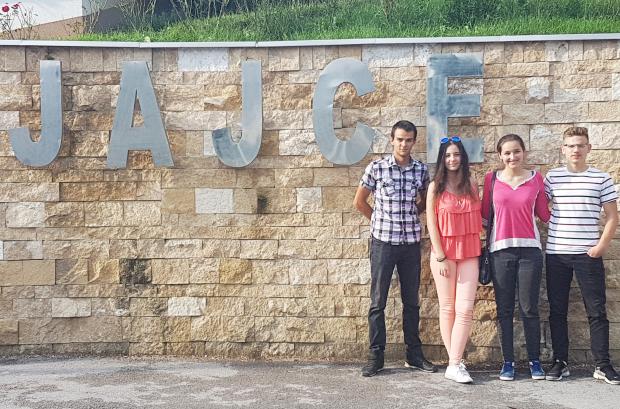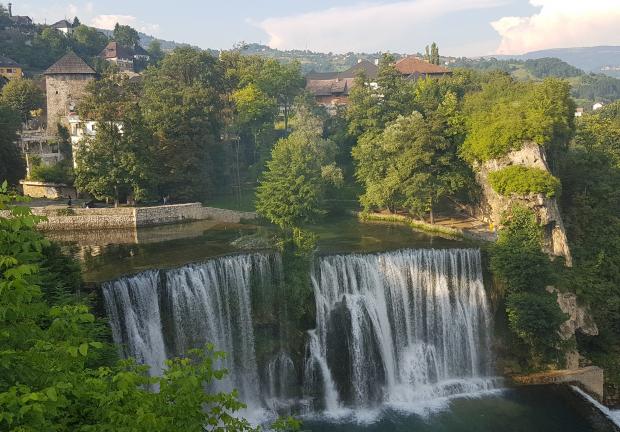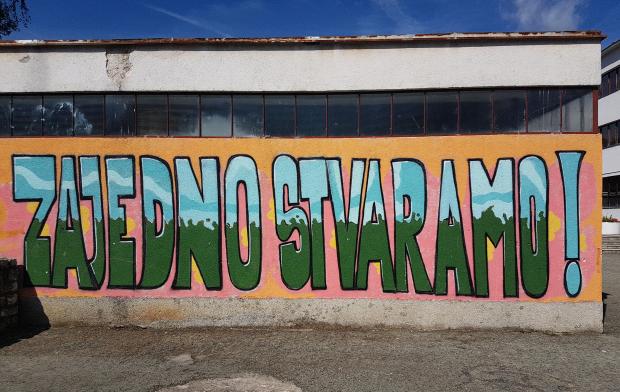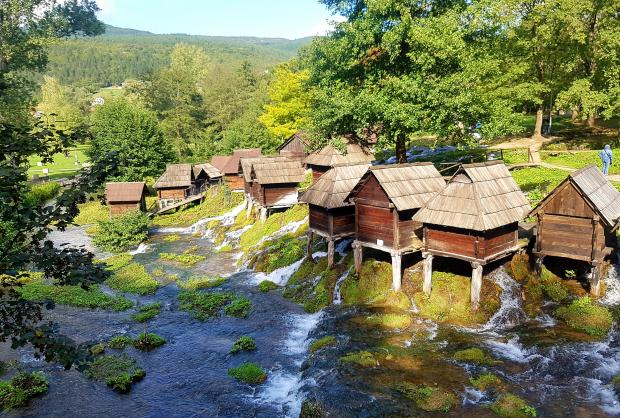A vision of unity: Jajce’s student movement for inclusive multi-ethnic education
Acknowledging the tenacity and moral authority of the brave students of Jajce, as well as recognizing the need to nurture their quest for inclusive and better quality education, the Jury made the unanimous decision to reward the students of this town in Bosnia and Herzegovina (BiH) with this year’s Max van der Stoel Award.
"My motive to campaign against the new school was a desire for unity," says Ajla Vrebac, a former student of Nikola Šop secondary school in Jajce. "Three constituent peoples live in our country, and it is wrong that we are being taught only about our differences. I believe that together we can achieve much more."
Vrebac, alongside peers from her school and Jajce secondary vocational school, demonstrated courage and determination as they took to the streets to protest against a proposal they felt would further segregate Jajce’s ethnically polarized communities.
Indeed, education fosters social cohesion in post-conflict and multi-ethnic societies. Therefore, overcoming segregation in schools and improving co-operation between different communities within the education system is a prerequisite to building and sustaining just, stable and peaceful countries. However, education is also prone to divisive discourses and policies, and in BiH multi-ethnic education has been a sensitive and controversial topic for decades.
The political structure of Bosnia and Herzegovina
Bosnia and Herzegovina comprises two entities: the Federation of Bosnia and Herzegovina (FBIH) and Republika Srpska (RS), both including the Brčko District as a self-governing administrative unit. The FBIH is further divided into ten cantons, each with its own administrative government and relative autonomy in domains such as education and health care. The majority of the population in BiH belongs to one of the country’s three constituent peoples as per the Constitution: Bosniaks, Croats and Serbs. In addition, BiH recognizes numerous national minorities. It is common practice that schools across the country teach the respective curriculum associated with one of the country’s constituent groups.
The summer of protest
In the summer of 2016, the authorities of the Central Bosnia Canton, in which Jajce lies, decided to establish a separate school solely for Bosniak students. It would operate independently on the existing premises of the Nikola Šop secondary school, and teach the Bosniak students a parallel national curriculum, instead of the Croatian curriculum they had been following thus far.
Displeased with the lack of consultation and refusing to be divided along ethnic lines, the students of Jajce resisted the Canton’s decision and campaigned against it throughout the summer. Many felt classroom segregation would not address the challenges at the heart of the education debate. The students’ cherished friendships and shared learning experiences prompted them to preserve diversity in the classroom, fight segregation, and lobby for inclusive and quality education throughout BiH. Ivica Jukanović, now a former student of the Jajce secondary vocational school, took part in the protests with the conviction that "young people need to be consulted more and make more independent decisions about their future.”

Despite few resources and little experience in activism, the students successfully pressured the Canton’s authorities to halt the implementation of a separate school, and gained widespread support for their grassroots initiative. The students’ campaign embodied the dissatisfaction that many felt with the education system in BiH, invigorating a drive for quality and inclusive education as a means towards societal cohesion; a movement "led by ideals and not by interests," Jukanović says.
The Max van der Stoel Award recognizes extraordinary and outstanding achievements in improving the position of national minorities in OSCE participating States. It is awarded every two years to a person, group or institution by the Dutch Foreign Ministry in co-operation with the OSCE High Commissioner on National Minorities (HCNM), and honours van der Stoel, a prominent Dutch statesperson who was the first HCNM.
Students and young people who see their successful futures in their own country under threat should be heard. Their fight for integrated education should be recognized. This year’s award recipients fought to promote and preserve the concept of integration and are an inspiration for others to follow, both in BiH and abroad.
Lamberto Zannier OSCE High Commissioner on National Minorities
"Two schools under one roof"
The practice of "two schools under one roof" refers to schools managed by distinct administrative bodies where students are separated along ethnic lines and follow their own tailor-made curriculum.
Across the Federation of BIH, cantons have decision-making powers over educational policies as is the case in the Central Bosnia Canton. "Two schools under one roof" is highly prevalent here with many segregated schools housed within the same facility. But they have different operating hours and separate entrances, thereby severely limiting interactions between students of different ethnic backgrounds. The practice is rooted in the structural legacies of the armed conflict between 1992 and 1995 and the subsequent constitutional framework laid out in the Dayton Peace Agreement.
"Since the war, the country’s education system has been characterized by division and segregation, with the vast majority of children learning separately according to ‘their’ ethno-national group," says Ambassador Bruce G. Berton, Head of the OSCE Mission to BiH. "This does not promote the values of a democratic society, respect for diversity or reconciliation. On the contrary, it entrenches divisions along ethnic lines. Furthermore, segregated education deprives the children of this country from receiving quality education free from political, religious, cultural and other biases."
The decentralization of BiH’s educational systems continues to defy efforts and legal measures to revoke the practice, including a 2014 Supreme Court ruling that this practice was discriminatory.
The HCNM, the OSCE and other international organizations strongly support inclusive educational reforms: Ambassador Berton explains that "in the immediate post-war period, some interim measures (such as "two schools under one roof") were understandable as parents wanted to avoid exposing their children to an unwelcoming school environment. But 22 years later, these concerns are far less grounded. The perpetuation of such fears is more a reflection of broader societal mistrust and polarization rather than an objective assessment of teaching environments."

Segregation "a bad investment"
As societal segregation continues to affect people’s lives, the Jajce students have been wary of the ongoing ethno-nationalist rhetoric. Nikolas Rimac from Jajce’s secondary vocational school explains: "by dividing students, we lose prosperity, the essence of our people, and youth. Young people are not leaving here just to look for better jobs. It is also because they do not know how to confront these isolationist policies."
Azra Keljalić, President of Jajce vocational school’s student council, adds: "segregation in Bosnia and Herzegovina is more expensive than improving the quality of our education."
Success requires hard work and the Jajce students are pleased that their perseverance paid off. "It was only when we reflected on our efforts later, that we realized that we had protected our rights and won against this system," says Tarik Šehić, a student of the Nikola Šop school.
Community reaction
The students appreciated the communities’ support. They also inspired others. "The students showed courage and maturity and served as an example to the adults. We must never forget that we are here for the students, and not them for us," says Zdenko Ištvanić, Director of Jajce secondary vocational school.
"I am proud that the students questioned a political decision which affects them and their future, rejected it as harmful, and then demanded different solutions using all the democratic tools available," said Amela Kavazbašić, a teacher at the Jajce secondary vocational school.
Still, there was some resistance: proponents of segregated schools claim that ethnically mixed classrooms favour one ethnic group over the others. The language of instruction and ethnically-sensitive subjects, such as history or geography, remain serious points of contention and are used as a rationale against inter-ethnic education systems. Meanwhile, one-sided historical narratives continue to threaten societal cohesion by perpetuating divisions and mutual grievances rooted in the 1990s conflict.
The students from Jajce need the unreserved support of their parents, teachers and local politicians. They also need foreign ambassadors and members of the international community to engage and lobby to completely abolish segregation in the education system. I see the engagement of the Jajce students as their duty and responsibility.
Samir BeharićFormer student
There is some progress on this front. The Mayor of Jajce, Edin Hozan, has expressed his solidarity with the students. "We are proud of all of them and I am really glad that this happened in Jajce – and that we, the citizens of Jajce, have declared that we want a better education system and better quality of life."

A Message to Others
The students’ brave vision of a shared future and communal learning is laudable. Yet the Jajce students admit there is much more to do: given the politicization of education policies, the abolition of the “two schools under one roof” practice requires a long-term investment.
Nonetheless, the students and their anti-segregation campaign have made a lasting mark.
"We must continue to be persistent, stubborn, and smart about achieving our goals," says Keljalić.
Vrebac is even more forthright: "Unity is a tool to achieve success!"


